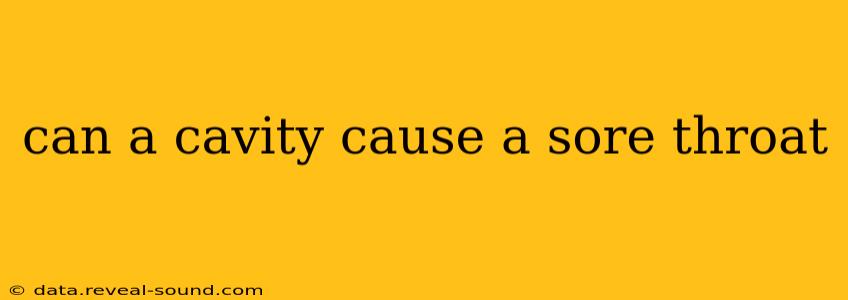Can a Cavity Cause a Sore Throat?
While not directly, a cavity can indirectly contribute to a sore throat. The connection isn't a simple cause-and-effect, but rather a consequence of potential complications arising from an untreated cavity. Let's explore this relationship in detail.
How Cavities Can Lead to Sore Throat Symptoms:
A cavity, or dental caries, is a hole in the tooth caused by tooth decay. The decay itself doesn't cause a sore throat. However, several scenarios stemming from a cavity can lead to throat discomfort:
-
Infection: Untreated cavities can become infected. This infection can spread from the tooth to the surrounding gum tissue and potentially even further, affecting the jawbone or lymph nodes. Inflammation in these areas can trigger referred pain, which is felt in a different location than the source of the problem. This referred pain might manifest as a sore throat.
-
Abscess Formation: A severe infection from a cavity can lead to an abscess, a pocket of pus that forms within the tooth or gums. An abscess can cause significant pain, swelling, and even fever. The swelling can put pressure on surrounding tissues, including the throat, leading to discomfort and a sore throat feeling.
-
Swallowing Difficulties: Severe tooth pain from a cavity can make swallowing difficult or painful. The constant strain and discomfort of swallowing can, in turn, lead to a sore throat.
-
Postnasal Drip: Some people experience postnasal drip (excess mucus dripping down the back of the throat) as a symptom of a dental infection. This constant dripping can irritate the throat and contribute to soreness. While not directly from the cavity itself, it's an indirect consequence of the infection it might cause.
It's crucial to understand that the sore throat isn't caused by the cavity itself but by the complications arising from its neglect. A healthy, treated cavity won't cause a sore throat.
What if I have a sore throat and suspect a cavity?
If you're experiencing a sore throat and suspect a cavity, it's essential to see both your dentist and your doctor.
-
Your dentist can examine your teeth and identify any cavities or infections. They can provide appropriate treatment, such as fillings, root canals, or extractions, to address the underlying dental problem.
-
Your doctor can assess your overall health and determine if the sore throat is linked to a dental infection or another cause, such as a viral or bacterial infection. They might prescribe antibiotics or other treatments depending on the diagnosis.
Can a Cavity Cause a Sore Throat and Fever?
Yes, a severe dental infection resulting from a neglected cavity can cause both a sore throat and a fever. The fever is a systemic response to the infection, indicating the body's fight against the bacteria. This combination of symptoms requires immediate medical attention.
Can a Cavity Cause a Sore Throat and Swollen Lymph Nodes?
Similarly, swollen lymph nodes in the neck or jaw area can accompany a sore throat and a dental infection stemming from a cavity. The lymph nodes swell as part of the body's immune response to fight the infection. This is another sign of a potentially serious situation requiring prompt professional medical care.
When to Seek Medical Attention:
Don't hesitate to seek medical attention if you experience a sore throat accompanied by any of the following:
- High fever
- Swollen lymph nodes
- Difficulty swallowing
- Severe jaw pain or swelling
- Pus or discharge from the gums
Remember, addressing the underlying dental issue is crucial in resolving the sore throat. Regular dental checkups and good oral hygiene are vital for preventing cavities and related complications. Early detection and treatment of cavities are essential for maintaining your overall oral and systemic health.
